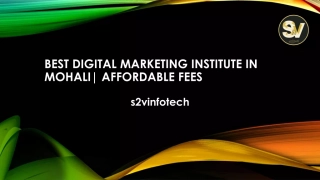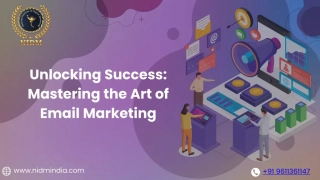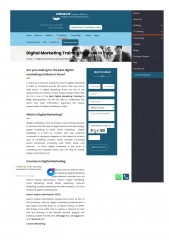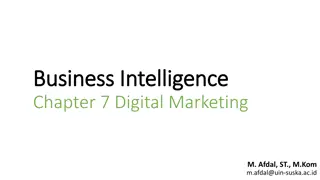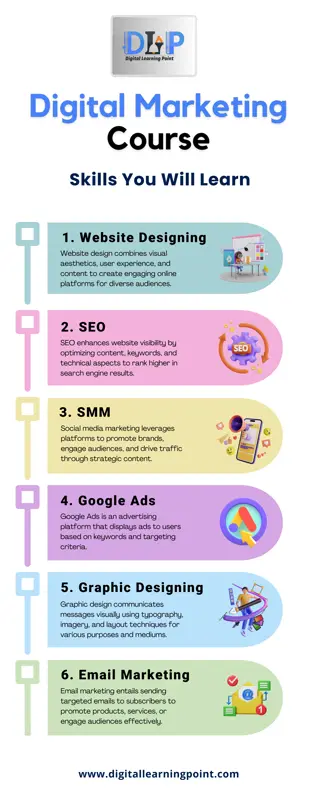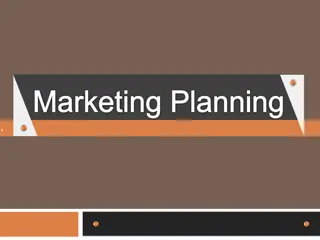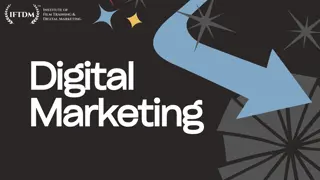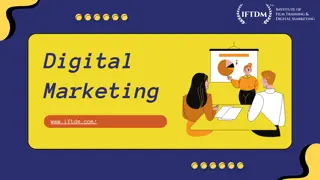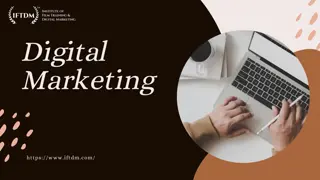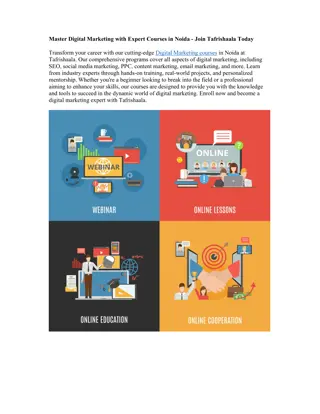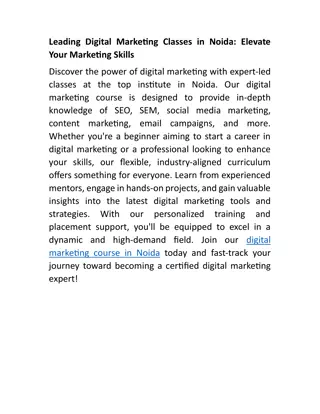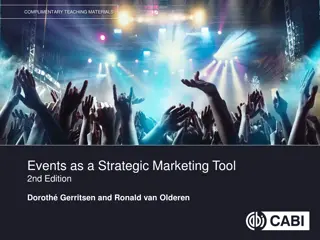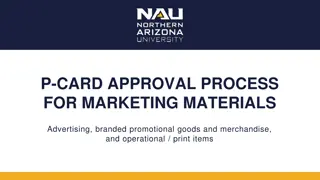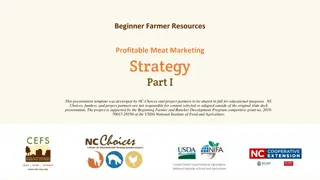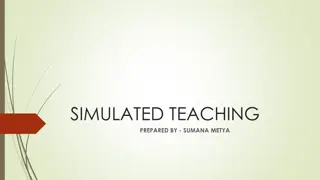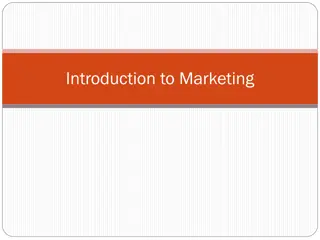Events as a Strategic Marketing Tool - Teaching Materials Edition
Explore the comprehensive teaching materials focusing on utilizing events as a strategic marketing tool. Dive into the translation of strategy into concept, the EVENT model, and bridging objectives with events. Learn about values, demand analysis, and supply evaluation in event planning through engaging content and visuals.
Download Presentation

Please find below an Image/Link to download the presentation.
The content on the website is provided AS IS for your information and personal use only. It may not be sold, licensed, or shared on other websites without obtaining consent from the author. Download presentation by click this link. If you encounter any issues during the download, it is possible that the publisher has removed the file from their server.
E N D
Presentation Transcript
COMPLIMENTARY TEACHING MATERIALS Events as a Strategic Marketing Tool 2nd Edition Doroth Gerritsen and Ronald van Olderen
Part II Do Chapter 8 The Translation of Strategy into Concept COMPLIMENTARY TEACHING MATERIALS
Phase: (plan and) do Chapter 8 Chapter 9 COMPLIMENTARY TEACHING MATERIALS
The EVENTS model COMPLIMENTARY TEACHING MATERIALS
The EVENTS model, do phase COMPLIMENTARY TEACHING MATERIALS
Chapter 8 COMPLIMENTARY TEACHING MATERIALS
The translation of strategy into concept From party to meaningful experience COMPLIMENTARY TEACHING MATERIALS
Contents lecture Analysis of supply and demand Staged experience and true experience The psychosocial framework Storytelling What s in a concept? The experience concept Creativity and development experience concept The experience tool COMPLIMENTARY TEACHING MATERIALS
Analysis of the demand Values are a essential component of our cognitive system and they determine our expectations of people and things. Values affect how people think and act and handle information. Values are criteria that people use to test information. COMPLIMENTARY TEACHING MATERIALS
Analysis of the supply The initiator of an event also has values. What does the city or brand want to transfer? To what extend do those values correspond to those of the visitors? COMPLIMENTARY TEACHING MATERIALS
Building a bridge between objectives and an event COMPLIMENTARY TEACHING MATERIALS
Staged and true experience Staged experience: staged event COMPLIMENTARY TEACHING MATERIALS
Stage and true experience True experience: determined per person individually COMPLIMENTARY TEACHING MATERIALS
Staged and true experience Levels of true experience COMPLIMENTARY TEACHING MATERIALS
Staged and true experience COMPLIMENTARY TEACHING MATERIALS
The psychosocial framework Knowledge Expectations and past experiences Motives Moods Involvement Social context Personality and competencies Values COMPLIMENTARY TEACHING MATERIALS
Storytelling Every true experience is a personal story about an actual staged experience. COMPLIMENTARY TEACHING MATERIALS
Storytelling The storyline and the phases of an event COMPLIMENTARY TEACHING MATERIALS
Whats in a concept? The active principle that creates coherence and gives direction to the realization of one or several goals. What makes it tick? The active principle is conciously exploited for the realization of a goal. COMPLIMENTARY TEACHING MATERIALS
Whats in a concept? 3FM Serious Request Burning Man Tomorrowland Andr Rieu Jamie Oliver Unox New Year s Day Dip COMPLIMENTARY TEACHING MATERIALS
The experience concept: five criteria its authenticity can be felt Distinctive and unique, a surprising combination of existing elements Endurance, over a long period of time Several layers Well timed (trends and developments but also intuitively) Meaningful, basing on values relevant to the target group, COMPLIMENTARY TEACHING MATERIALS
Creativity and developing an experience concept (concept ontwikkelen) COMPLIMENTARY TEACHING MATERIALS
Creativity and developing an experience concept The creative process COMPLIMENTARY TEACHING MATERIALS
The experience tools Required for staging an event. Six tools: 1. Thematizing 2. Storytelling 3. Senses 4. Play 5. Co-creation 6. Personnel COMPLIMENTARY TEACHING MATERIALS
The experience tools 1. Thematizing Themes can be based on: history or epochs, example thematic festivals culture or (sub)cultures, example Sail Amsterdam fiction, example Harry Potter nature, example beachparty technology, example railway museum COMPLIMENTARY TEACHING MATERIALS
1. Thematizing Holland Heineken House COMPLIMENTARY TEACHING MATERIALS
The experience tools 2. Storytelling Explicit storytelling: a story is literally narrated by someone, whether or not by interaction. Example: A lantern tour through a dark Arnhem Open Air Museum with a narrator in a black robe. The aim is that the visitor experiences the 19th century life in the dark at night. Implicit storytelling: visual representationor object triggers a story in the visiter. He fills it with his own powers of imagination. COMPLIMENTARY TEACHING MATERIALS
The experience tools 3. Senses Senses cause emotions Emotions are the crucial factor for an experience The more intense the experience Example: MeetUp of congress and exhibition centre Jaarbeurs Utrecht COMPLIMENTARY TEACHING MATERIALS
The experience tools 4. Play Closely linked to sport Online games and physical Full of surprises Provides scope for creativity Enables player to develop his cognitive and motor skills, and his emotional skills COMPLIMENTARY TEACHING MATERIALS
The experience tools 5. Co-creation Involving the customer in designing the experience that is most in accordance with the meaning that he personally wants to give his life. Freedom of choice experienced Intrinsic motivation Interaction Creativity Self-development There is no pre-determined result COMPLIMENTARY TEACHING MATERIALS
The experience tools 6. Personnel Customer friedliness Commitment of actors Empathic ability! Often temporary staff at events Storytelling is a suitable tool to motivate personnel COMPLIMENTARY TEACHING MATERIALS
Questions? COMPLIMENTARY TEACHING MATERIALS
Thank You COMPLIMENTARY TEACHING MATERIALS


